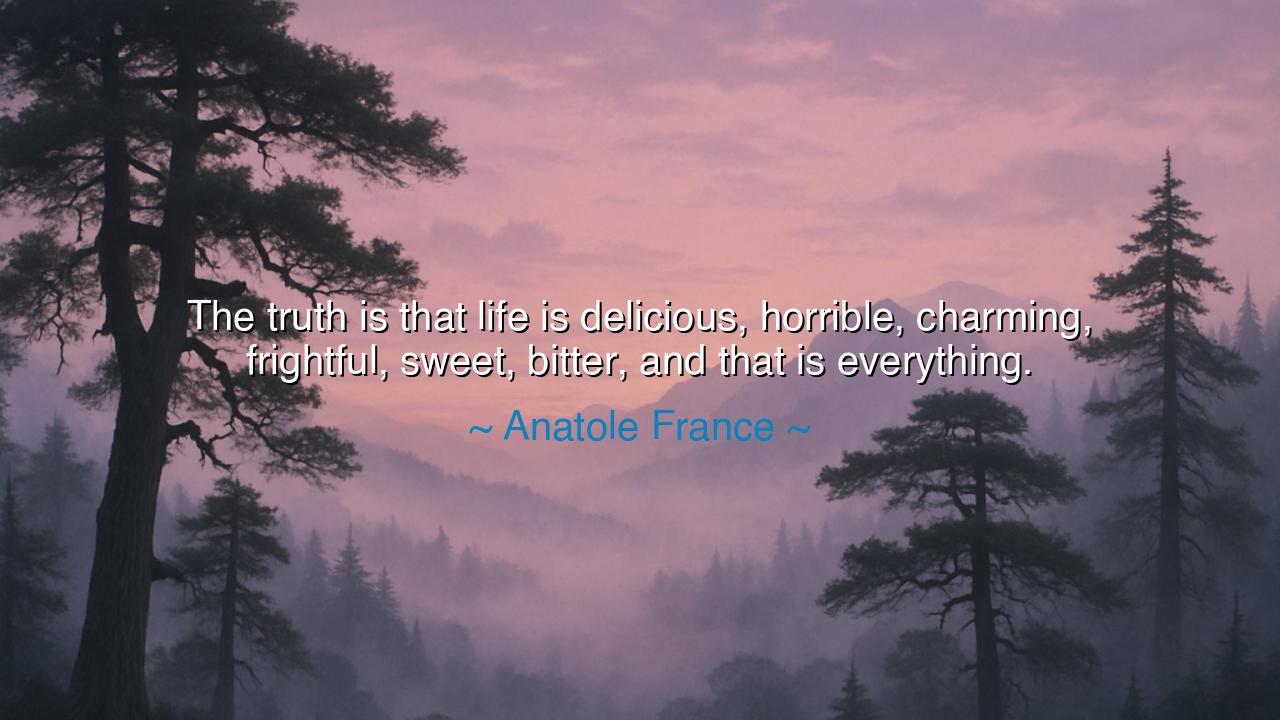
The truth is that life is delicious, horrible, charming
The truth is that life is delicious, horrible, charming, frightful, sweet, bitter, and that is everything.






Hear the luminous and sobering words of Anatole France: “The truth is that life is delicious, horrible, charming, frightful, sweet, bitter, and that is everything.” In this declaration, he does not flatter us with illusions of perfection, nor does he drag us into despair. Rather, he unveils the full tapestry of life—woven of contradictions, both joy and sorrow, beauty and terror. To see only one side is blindness; to embrace them all is wisdom.
The ancients, too, spoke in this way. The Greeks gave us tragedy and comedy, knowing that both were true and necessary. To laugh without ever weeping is to know only half of existence, and to mourn without ever laughing is to be buried while still alive. Anatole France reminds us that truth is not found in denial of pain nor in pursuit of endless pleasure, but in the acceptance that life is all of these at once: delicious and bitter, charming and frightful.
Consider the life of Abraham Lincoln. He knew crushing defeats and piercing grief, losing children and enduring ridicule. Yet he also knew the sweetness of triumph, the nobility of leading a nation, and the quiet delight of storytelling. His life was not one of unbroken joy nor of unrelieved sorrow—it was both. And it was this mixture, this balance of horrible and sweet, that forged his wisdom and gave him the strength to lead in the darkest of times.
We see the same in the story of Helen Keller. Deaf and blind from childhood, she lived what many would call a frightful existence. Yet through courage, discipline, and the guidance of her teacher Anne Sullivan, she discovered the delicious joy of learning and the charming wonder of human connection. Her life bore both the bitterness of limitation and the sweetness of triumph. It was precisely because she embraced all of it, not only the pleasant parts, that she became a beacon for generations.
Why is this truth so hard for us to accept? Because men crave certainty, and they desire to fix life into one category: either it is good, or it is bad; either joy, or sorrow. But the reality is richer, more complex, more mysterious. To demand only sweetness is to be crushed by bitterness; to expect only horror is to miss delight. The wise learn to take both into their hands, as day and night together form the wholeness of time.
The lesson, then, is this: do not flee from the horrible, nor cling too desperately to the delicious. Let both instruct you. Let bitterness teach you patience, and sweetness teach you gratitude. Let fear sharpen your courage, and charm soften your heart. When you feel despair, remember that joy still waits in the turning of the day. When you feel joy, remember that sorrow too will come, and prepare your soul to meet it with dignity.
Therefore, mark this teaching well: the truth of life is not in the fragments, but in the whole. Accept its contradictions, embrace its fullness, and you will not be broken when the bitter comes, nor deceived when the sweet lingers. You will walk with open eyes, tasting the richness of existence in all its colors. For to live is to know both delight and dread, both love and loss—and in the end, to say, as Anatole France did: that is everything.






HTNguyen Huy Tam
France’s quote hits the mark on how life is a collection of varied experiences, all contributing to the whole. We experience joy, pain, beauty, and fear all in one lifetime. Can we find peace in this mixture, or are we constantly searching for something more? How often do we deny the unpleasant parts of life in our quest for happiness, and what does that denial cost us in the end?
NANgoc Anh
This quote by France captures the paradox of life—the coexistence of beauty and difficulty. It makes me wonder, do we really understand what it means to live fully if we only focus on one aspect of life? Can we appreciate the sweetness of life without fully embracing the bitterness? How much of our suffering comes from resisting life’s complexities, rather than accepting them as part of the whole experience?
CThuong chi tran
Anatole France’s quote is a powerful reminder that life is not one-dimensional. The sweetness of life is often intertwined with its bitterness, and the joy we experience can be tempered by its challenges. How do we navigate the complexity of life without becoming overwhelmed by its contradictions? Should we accept that life will always have a mixture of the pleasant and the unpleasant, and embrace it for what it is?
UBPhuong Uyen Bui
This quote really speaks to the multifaceted nature of life. It’s easy to get caught up in the pursuit of happiness or to focus solely on the negative, but life encompasses all emotions and experiences. Can we ever fully appreciate life’s beauty without acknowledging its darker sides? Is it possible to find peace in the chaos of life, accepting both the charm and the frightfulness?
GNHa Giang Nguyen
France’s perspective on life resonates with the reality that it’s a blend of contrasts—pleasure and pain, joy and sorrow. We tend to seek comfort and avoid hardship, but what if life’s true richness lies in accepting both sides of the experience? Does the bitterness of life make the sweetness all the more precious, or does it just make the sweetness seem fleeting in comparison?